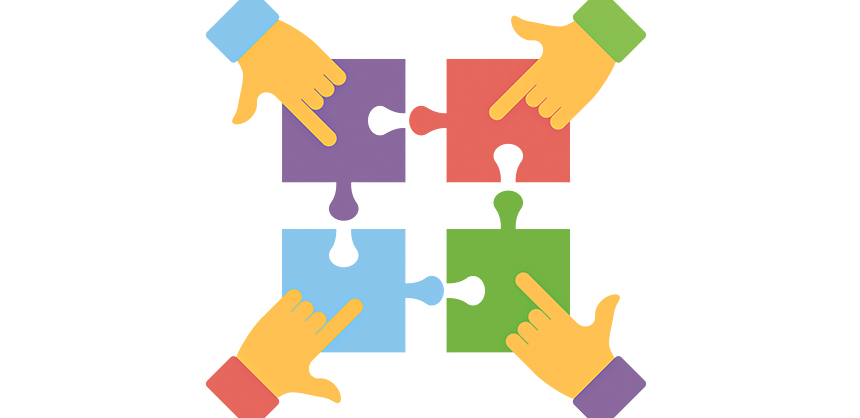Why Collaborative Learning is the Future of Event NetworkingMarch 4, 2020
Attendees Build Relationships by Working With Each Other By Smriti BansalWhy Collaborative Learning is the Future of Event Networking
Attendees Build Relationships by Working With Each Other
We’ve all come across iterations of the classic headline —Networking Tips for People Who Hate Networking.
For event industry professionals, networking is of particular importance. After all, it’s one of the main drivers for attendance at events around the world, Still, many participants either don’t love it, or just aren’t very skilled at it. This is where event professionals get creative: The challenge at hand is to build a welcoming environment for connections that actively support all participants — regardless of their comfort level with socializing. In their quest to meet the right people, they’ve invented elaborate networking games, planned for targeted networking sessions or even incorporated technology in the form of matching software or smart badges.
Yet, attendees still walk away feeling frustrated at the lack of quality connections they’ve made at an event.
(Traditional) Networking is Dead
In Event Icons episode #138, e180’s co-founder and CEO Christine Renaud asserted that traditional networking was dead — or that it should be. Event networking as most of us know it is often synonymous with the uncomfortable experience of navigating a room full of strangers with the hope of somehow finding a meaningful connection.
We would never leave the content our participants consume up to chance, so why do the same with the connections they could form at our events? We’re here to suggest a new way to think about connection experiences at events: What if instead of networking, event organizers planned for collaborative learning? The motivations behind networking can range from wanting to grow your network to wanting a new job. Within the context of everyday life, your participants might want to network for a number of reasons that reflect where they are professionally or personally.
So, what is collaborative learning? Collaborative learning is an educational approach that involves groups of people working together to solve a problem, complete a task or create a product. What distinguishes collaborative learning from other approaches to group-work is that each learner is responsible for one another’s learning, as well as their own. Every person in the group is the teacher and the student. They all work toward a common learning goal, regardless of their level of skill or expertise. That is to say, in a collaborative learning context, what matters is what you know, rather than who you are.
Networking Within the Context of Learning
As an organizer, you work hard to supply fantastic content and create ample networking opportunities at your events. What if you could do both at the same time? What if you could re-imagine networking within the context of learning? In fact, a focus on learning has proven to improve the networking experience by alleviating the “ick factor” often associated with it.
In a recent study, scientists Tiziana Casciaro, Francesca Gino and Maryam Kouchaki write that thinking of networking as “an opportunity for discovery and learning makes it feel less like a chore.” That is, even the most introverted of participants might view networking as a worthwhile activity if they can focus on how it might help them boost the knowledge and skills they need in their jobs. This is why we believe that collaborative learning experiences at events are the best alternative to traditional networking.
Research shows that collaborative learning:
Helps create a positive social support system for learners.
Helps create communities around common learning goals.
Encourages an atmosphere of cooperation.
Reduces the feeling of anxiety, and can improve a learner’s self esteem.
A successful collaborative learning experience has the potential to bring out each individual’s unique strengths, create a positive psychological experience, and instill a strong sense of community and belonging among the learners. Research has also shown that individuals who learned collaboratively were more likely to continue working together after a project was over and that the experience led to the formation of meaningful, long-lasting relationships.
Why should you care about collaborative learning?
Great event planners know that their responsibilities go beyond organizing the logistical details of an event. They understand that when a participant comes to their event, they are taking out time and often traveling great distances, just so that they can learn from and connect with the people who can help them take their organization or project to the next level. An event goes from being great to unforgettable when it gives its participants a transformative educational experience — when they can acquire the knowledge they need to do their job well or find solutions to the challenges they’re facing at work.
Having a star-studded lineup of speakers giving keynote addresses, hosting panels, workshops and sessions is not enough. These speakers face the impossible task of addressing the learning goal of each and every person attending the event — goals that are as different and diverse as the individuals themselves. Collaborative learning is effective because it transforms every participant into a potential source of knowledge — not just the speakers. It creates an atmosphere where participants know they can tap into the event community; that, in a sea of thousands, they can find the one person who has the answer to the question they’ve been asking.
Traditional networking doesn’t work because participants are placed in a room without context, without a reason to interact with each other. If a participant isn’t naturally extroverted, they must swallow their nerves and start a conversation. But, a conversation about what? So participants must prepare by artfully stalking those they want to connect with on LinkedIn or they must come armed with potential conversation topics. If they’re not naturally gifted at networking, they’ve probably read articles that tell them that the key to effective networking is giving, and how they can form lasting connections if they can find ways to help their peers. Even if they do all of the above, how can participants create meaningful connections if the context they’re in is divorced from meaning?
Collaborative learning is the better alternative to traditional networking because it acknowledges why people want to connect with each other — to learn from, and benefit from each other’s expertise. More importantly, it creates a space where participants have a reason to speak with each other. The relationships formed are deeper and longer lasting because they’re between people who share the same passion or are working toward similar objectives. As we imagine the future of events, how do we create an experience that extends beyond the “wow” factor of Instagram-ready installations, or celebrity appearances?
Find out what participants want to learn
Use surveys both pre- and post-event to find out the biggest challenges your attendees are facing or the subjects they’re most excited to learn about. Curate event content based on this information. Move away from the broadcast model, where one individual teaches a large group of people; instead plan for smaller sessions where participants can actively engage with each other, and have the time and space to dive into the specific topics they want to learn about, or find solutions to their most pressing challenges.
Network with a purpose
If you plan a networking session, ask participants to write down what they wish to learn on their name tag. Something this simple helps break the ice, and allows participants to form deeper connections based on mutual interests, as opposed to their job title. | AC&F |

Smriti Bansal








